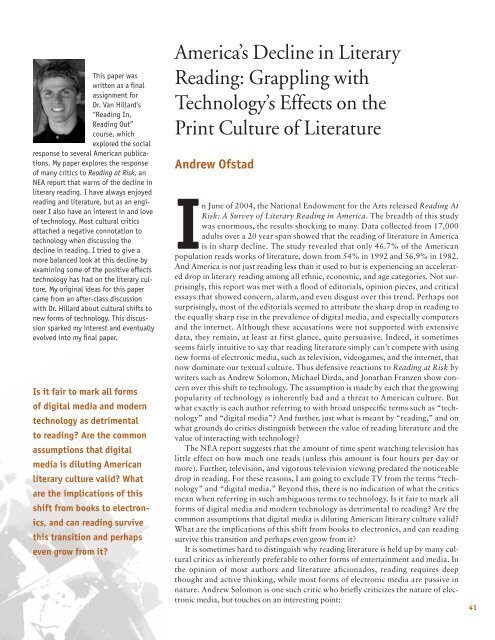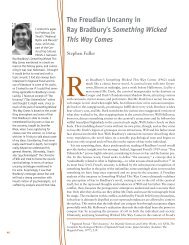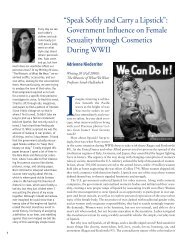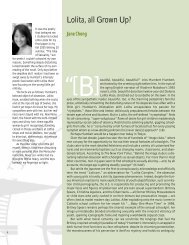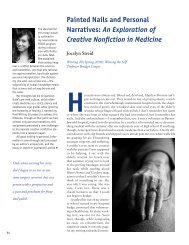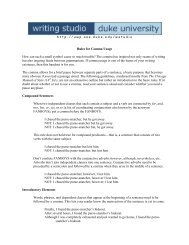America's Decline in Literary Reading: Grappling with Technology's ...
America's Decline in Literary Reading: Grappling with Technology's ...
America's Decline in Literary Reading: Grappling with Technology's ...
Create successful ePaper yourself
Turn your PDF publications into a flip-book with our unique Google optimized e-Paper software.
This paper was<br />
written as a f<strong>in</strong>al<br />
assignment for<br />
Dr. Van Hillard’s<br />
“Read<strong>in</strong>g In,<br />
Read<strong>in</strong>g Out”<br />
course, which<br />
explored the social<br />
response to several American publications.<br />
My paper explores the response<br />
of many critics to Read<strong>in</strong>g at Risk, an<br />
NEA report that warns of the decl<strong>in</strong>e <strong>in</strong><br />
literary read<strong>in</strong>g. I have always enjoyed<br />
read<strong>in</strong>g and literature, but as an eng<strong>in</strong>eer<br />
I also have an <strong>in</strong>terest <strong>in</strong> and love<br />
of technology. Most cultural critics<br />
attached a negative connotation to<br />
technology when discuss<strong>in</strong>g the<br />
decl<strong>in</strong>e <strong>in</strong> read<strong>in</strong>g. I tried to give a<br />
more balanced look at this decl<strong>in</strong>e by<br />
exam<strong>in</strong><strong>in</strong>g some of the positive effects<br />
technology has had on the literary culture.<br />
My orig<strong>in</strong>al ideas for this paper<br />
came from an after-class discussion<br />
<strong>with</strong> Dr. Hillard about cultural shifts to<br />
new forms of technology. This discussion<br />
sparked my <strong>in</strong>terest and eventually<br />
evolved <strong>in</strong>to my f<strong>in</strong>al paper.<br />
Is it fair to mark all forms<br />
of digital media and modern<br />
technology as detrimental<br />
to read<strong>in</strong>g? Are the common<br />
assumptions that digital<br />
media is dilut<strong>in</strong>g American<br />
literary culture valid? What<br />
are the implications of this<br />
shift from books to electronics,<br />
and can read<strong>in</strong>g survive<br />
this transition and perhaps<br />
even grow from it?<br />
America’s <strong>Decl<strong>in</strong>e</strong> <strong>in</strong> <strong>Literary</strong><br />
Read<strong>in</strong>g: Grappl<strong>in</strong>g <strong>with</strong><br />
Technology’s Effects on the<br />
Pr<strong>in</strong>t Culture of Literature<br />
Andrew Ofstad<br />
In June of 2004, the National Endowment for the Arts released Read<strong>in</strong>g At<br />
Risk: A Survey of <strong>Literary</strong> Read<strong>in</strong>g <strong>in</strong> America. The breadth of this study<br />
was enormous, the results shock<strong>in</strong>g to many. Data collected from 17,000<br />
adults over a 20 year span showed that the read<strong>in</strong>g of literature <strong>in</strong> America<br />
is <strong>in</strong> sharp decl<strong>in</strong>e. The study revealed that only 46.7% of the American<br />
population reads works of literature, down from 54% <strong>in</strong> 1992 and 56.9% <strong>in</strong> 1982.<br />
And America is not just read<strong>in</strong>g less than it used to but is experienc<strong>in</strong>g an accelerated<br />
drop <strong>in</strong> literary read<strong>in</strong>g among all ethnic, economic, and age categories. Not surpris<strong>in</strong>gly,<br />
this report was met <strong>with</strong> a flood of editorials, op<strong>in</strong>ion pieces, and critical<br />
essays that showed concern, alarm, and even disgust over this trend. Perhaps not<br />
surpris<strong>in</strong>gly, most of the editorials seemed to attribute the sharp drop <strong>in</strong> read<strong>in</strong>g to<br />
the equally sharp rise <strong>in</strong> the prevalence of digital media, and especially computers<br />
and the <strong>in</strong>ternet. Although these accusations were not supported <strong>with</strong> extensive<br />
data, they rema<strong>in</strong>, at least at first glance, quite persuasive. Indeed, it sometimes<br />
seems fairly <strong>in</strong>tuitive to say that read<strong>in</strong>g literature simply can’t compete <strong>with</strong> us<strong>in</strong>g<br />
new forms of electronic media, such as television, videogames, and the <strong>in</strong>ternet, that<br />
now dom<strong>in</strong>ate our textual culture. Thus defensive reactions to Read<strong>in</strong>g at Risk by<br />
writers such as Andrew Solomon, Michael Dirda, and Jonathan Franzen show concern<br />
over this shift to technology. The assumption is made by each that the grow<strong>in</strong>g<br />
popularity of technology is <strong>in</strong>herently bad and a threat to American culture. But<br />
what exactly is each author referr<strong>in</strong>g to <strong>with</strong> broad unspecific terms such as “technology”<br />
and “digital media”? And further, just what is meant by “read<strong>in</strong>g,” and on<br />
what grounds do critics dist<strong>in</strong>guish between the value of read<strong>in</strong>g literature and the<br />
value of <strong>in</strong>teract<strong>in</strong>g <strong>with</strong> technology?<br />
The NEA report suggests that the amount of time spent watch<strong>in</strong>g television has<br />
little effect on how much one reads (unless this amount is four hours per day or<br />
more). Further, television, and vigorous television view<strong>in</strong>g predated the noticeable<br />
drop <strong>in</strong> read<strong>in</strong>g. For these reasons, I am go<strong>in</strong>g to exclude TV from the terms “technology”<br />
and “digital media.” Beyond this, there is no <strong>in</strong>dication of what the critics<br />
mean when referr<strong>in</strong>g <strong>in</strong> such ambiguous terms to technology. Is it fair to mark all<br />
forms of digital media and modern technology as detrimental to read<strong>in</strong>g? Are the<br />
common assumptions that digital media is dilut<strong>in</strong>g American literary culture valid?<br />
What are the implications of this shift from books to electronics, and can read<strong>in</strong>g<br />
survive this transition and perhaps even grow from it?<br />
It is sometimes hard to dist<strong>in</strong>guish why read<strong>in</strong>g literature is held up by many cultural<br />
critics as <strong>in</strong>herently preferable to other forms of enterta<strong>in</strong>ment and media. In<br />
the op<strong>in</strong>ion of most authors and literature aficionados, read<strong>in</strong>g requires deep<br />
thought and active th<strong>in</strong>k<strong>in</strong>g, while most forms of electronic media are passive <strong>in</strong><br />
nature. Andrew Solomon is one such critic who briefly criticizes the nature of electronic<br />
media, but touches on an <strong>in</strong>terest<strong>in</strong>g po<strong>in</strong>t:<br />
41
42<br />
The electronic media...tend to be torpid. Despite<br />
the existence of good television, f<strong>in</strong>e writ<strong>in</strong>g on<br />
the <strong>in</strong>ternet, and video games that test logic, the<br />
electronic media by and large <strong>in</strong>vite <strong>in</strong>ert reception.<br />
One selects channels, but then the <strong>in</strong>formation<br />
comes out preprocessed. (1)<br />
Solomon asserts that electronic<br />
media offer passive forms of enterta<strong>in</strong>ment<br />
but also admits that the<br />
<strong>in</strong>ternet, videogames, and some<br />
forms of “good television” don’t<br />
necessarily fit this description. He<br />
gives slight credit to a few virtues of<br />
electronic media, but perhaps not<br />
enough credit where credit is due. It<br />
is true that television is a passive<br />
form of enterta<strong>in</strong>ment. The viewer<br />
typically sits <strong>in</strong> front of the screen<br />
and absorbs, as Solomon would put<br />
it, “preprocessed” <strong>in</strong>formation that<br />
for the most part doesn’t require<br />
much thought. Conversely, read<strong>in</strong>g<br />
requires active engagement and submerges<br />
the reader <strong>in</strong>to an alternate environment<br />
where the imag<strong>in</strong>ation takes control, only guided by<br />
the words on the page. Is this active participation,<br />
this submersion <strong>in</strong> an environment mediated by<br />
pr<strong>in</strong>t, what the critics f<strong>in</strong>d most important about<br />
read<strong>in</strong>g? If so, some videogames can be shown to<br />
<strong>in</strong>volve this same form of <strong>in</strong>tellectual submersion.<br />
Many role-play<strong>in</strong>g games require the player to solve<br />
<strong>in</strong>tricate puzzles <strong>in</strong> order to advance through a deep<br />
plot. Much as books capture our concentration and<br />
br<strong>in</strong>g us to a different place <strong>with</strong><strong>in</strong> the m<strong>in</strong>d, video<br />
games can br<strong>in</strong>g the player <strong>in</strong>to an active and dynamic<br />
world where thought is required to solve complicated<br />
puzzles. The player isn’t simply passively view<strong>in</strong>g<br />
as is done when watch<strong>in</strong>g TV; he or she is actively<br />
participat<strong>in</strong>g <strong>in</strong> an expansive environment where<br />
reason<strong>in</strong>g and quick decision mak<strong>in</strong>g predom<strong>in</strong>ate.<br />
Obviously some games require more th<strong>in</strong>k<strong>in</strong>g than<br />
others. Some games are more ak<strong>in</strong> to sports, test<strong>in</strong>g<br />
reflex and concentration but not necessarily logic.<br />
However, other video game genres such as role-play<strong>in</strong>g<br />
and strategy games can be shown to promote logical<br />
thought, and therefore stimulate <strong>in</strong>telligence. In<br />
fact, a recent study done by the Economic and Social<br />
Research Council shows that videogames, if played<br />
<strong>in</strong> moderation, may improve <strong>in</strong>telligence <strong>in</strong> young<br />
children (“Do Video Games,” 2004, para. 1).<br />
From my childhood, I can dist<strong>in</strong>ctly remember<br />
be<strong>in</strong>g lost <strong>in</strong> the complicated and mysterious world of<br />
Myst, an immensely successful videogame from the<br />
early n<strong>in</strong>eties. In order to reveal the secrets of the<br />
“mystify<strong>in</strong>g” environment, players had to solve puzzles,<br />
some <strong>in</strong>volv<strong>in</strong>g mathematics, others <strong>in</strong>volv<strong>in</strong>g<br />
clues picked up along the path. These are puzzles that<br />
Granted, video games<br />
may not offer<br />
precisely the same<br />
experience as books,<br />
and certa<strong>in</strong>ly they<br />
should not replace<br />
books. Rather, they<br />
offer another way<br />
to enter <strong>in</strong>to an<br />
imag<strong>in</strong>ed world.<br />
I never would have encountered outside of a<br />
videogame, and I have found that such games made<br />
an impression on my th<strong>in</strong>k<strong>in</strong>g at a young age.<br />
Granted, video games may not offer precisely the<br />
same experience as books, and certa<strong>in</strong>ly they should<br />
not replace books. Rather, they offer<br />
another way to enter <strong>in</strong>to an imag<strong>in</strong>ed<br />
world. They are similar to<br />
books <strong>in</strong> this respect but offer tradeoffs<br />
<strong>in</strong> the type of th<strong>in</strong>k<strong>in</strong>g that is<br />
required. When read<strong>in</strong>g, the imag<strong>in</strong>ation<br />
is called upon to translate<br />
words <strong>in</strong>to ideas, concepts, and<br />
images. Play<strong>in</strong>g a videogame requires<br />
active problem solv<strong>in</strong>g and,<br />
though to a lesser extent, imag<strong>in</strong>ation<br />
and conceptualization. Perhaps<br />
some forms of digital media that the<br />
critics are so ready to condemn have<br />
virtues ak<strong>in</strong> to those associated <strong>with</strong><br />
literary read<strong>in</strong>g.<br />
Nevertheless, backed by statistics<br />
from Read<strong>in</strong>g at Risk suggest<strong>in</strong>g that<br />
those who read literature are more likely than those<br />
who do not to participate <strong>in</strong> social activities and even<br />
politics, Solomon goes even further <strong>in</strong> his critique,<br />
characteriz<strong>in</strong>g the rise of technology and the subsequent<br />
decl<strong>in</strong>e <strong>in</strong> read<strong>in</strong>g as a political detriment:<br />
Without books, we cannot succeed <strong>in</strong> our current<br />
struggle aga<strong>in</strong>st absolutism and terrorism. The<br />
retreat from civic to virtual life is a retreat from<br />
engaged democracy, from the pr<strong>in</strong>ciples that<br />
we say we want to share <strong>with</strong> the rest of the<br />
world....So the crisis <strong>in</strong> read<strong>in</strong>g is a crisis <strong>in</strong><br />
national politics. (2)<br />
But does the <strong>in</strong>ternet truly result <strong>in</strong> a “retreat<br />
from engaged democracy” as Solomon says? Could it<br />
not be, rather, an <strong>in</strong>credible asset to democracy?<br />
Solomon may be right <strong>in</strong> say<strong>in</strong>g that read<strong>in</strong>g is<br />
important to democracy, as read<strong>in</strong>g is fundamental<br />
to communication and knowledge of our world. But<br />
is there really a difference between the civic and virtual<br />
life that Solomon speaks of? Civic life has made<br />
our country what it is today, and is <strong>in</strong>valuable to any<br />
society. But why can’t “virtual life” be civic life?<br />
Assum<strong>in</strong>g that Solomon is talk<strong>in</strong>g about the <strong>in</strong>ternet<br />
when he refers to “virtual life,” what would he make<br />
of political blogs, message boards, and a myriad of<br />
<strong>in</strong>dependent news organizations that allow many<br />
Americans to voice an op<strong>in</strong>ion and that provide a<br />
variety of resources from which <strong>in</strong>formation can be<br />
drawn? The <strong>in</strong>ternet is a democratic bazaar that<br />
<strong>in</strong>forms the citizenry, can potentially give nearly<br />
every <strong>in</strong>dividual a voice, and provides a medium for<br />
diverse discussion of political issues. Take for<br />
<strong>in</strong>stance the <strong>in</strong>sight ga<strong>in</strong>ed from the Iraqi who<br />
blogged throughout our strike on Baghdad, or the
The <strong>in</strong>ternet is a<br />
democratic bazaar that<br />
<strong>in</strong>forms the citizenry,<br />
can potentially give<br />
nearly every <strong>in</strong>dividual<br />
a voice, and provides a<br />
medium for diverse<br />
Customer reviews,<br />
personalized book lists,<br />
and an almost unlimited<br />
supply of books give<br />
the user someth<strong>in</strong>g of a<br />
virtual “social” environ-<br />
ment <strong>in</strong> which great<br />
books can quickly and<br />
easily be found, ordered,<br />
and read. Internet<br />
booksellers can provide,<br />
as Solomon would put<br />
it, an onl<strong>in</strong>e “k<strong>in</strong>ship <strong>in</strong><br />
the shar<strong>in</strong>g of books” (2).<br />
high school students who started a political<br />
blog <strong>in</strong> which people from around the world<br />
discussed matters of politics. Contrary to<br />
Solomon’s suspicions, these resources are<br />
engag<strong>in</strong>g average citizens <strong>in</strong> democracy <strong>in</strong> a<br />
way never before possible rather than caus<strong>in</strong>g<br />
a “retreat from engaged democracy.” Just as<br />
books are vital to our “struggle aga<strong>in</strong>st absolutism<br />
and terrorism,” these digital sources of<br />
<strong>in</strong>formation can provide us <strong>with</strong> <strong>in</strong>formation<br />
that is drawn from a multitude of voices from<br />
diverse backgrounds. S<strong>in</strong>ce the <strong>in</strong>ternet is<br />
uncontrolled, it is somewhat of a refuge from<br />
absolutism and gives the user an <strong>in</strong>ternational<br />
arena <strong>in</strong> which diverse ideas can be exchanged<br />
freely. In a sense, what could be more democratic<br />
than the <strong>in</strong>ternet?<br />
It is somewhat commonplace for scholars<br />
to criticize, often times unfairly, forms of<br />
“digital media.” But regardless of the benefits<br />
that the <strong>in</strong>ternet, video games, and other<br />
forms of digital media offer, the fact rema<strong>in</strong>s<br />
that literary read<strong>in</strong>g is important to our society.<br />
<strong>Literary</strong> read<strong>in</strong>g is a primary way <strong>in</strong><br />
which ideas and new perspectives are communicated<br />
and tested, and it engages the reader<br />
<strong>in</strong> imag<strong>in</strong>ative, speculative thought. Without<br />
discount<strong>in</strong>g the tremendous value of literary<br />
read<strong>in</strong>g, then, is it somehow possible for literary<br />
read<strong>in</strong>g and digital media to coexist, and<br />
could digital media perhaps even promote literary<br />
read<strong>in</strong>g?<br />
One way many believe literary read<strong>in</strong>g can<br />
be made more popular is by figur<strong>in</strong>g it as a<br />
communal endeavor. Solomon, for <strong>in</strong>stance,<br />
offers this strategy:<br />
We need to make read<strong>in</strong>g, which is <strong>in</strong> its<br />
essence a solitary endeavor, a social one as<br />
well, to encourage the great thrill of f<strong>in</strong>d<strong>in</strong>g<br />
k<strong>in</strong>ship <strong>in</strong> shared experiences of books.<br />
We must weave read<strong>in</strong>g back <strong>in</strong>to the very<br />
fabric of the culture, and make it a ma<strong>in</strong>stay<br />
of community. (1)<br />
Although read<strong>in</strong>g is on the decl<strong>in</strong>e, social<br />
read<strong>in</strong>g has been an effective tool <strong>in</strong> help<strong>in</strong>g<br />
to re-popularize literature. The success of<br />
Oprah’s book club shows how communal<br />
read<strong>in</strong>g can get more people read<strong>in</strong>g fiction,<br />
even if this fiction isn’t always of the highest<br />
quality. Similarly, I th<strong>in</strong>k that technology can<br />
help to popularize literature. Internet booksellers,<br />
such as Amazon.com, have already<br />
begun to create an onl<strong>in</strong>e “book society” <strong>with</strong><br />
their market<strong>in</strong>g strategies. Amazon.com<br />
builds a database of the books the consumer<br />
has purchased and, based on these books,<br />
suggests other similar books a particular<br />
reader might enjoy. Further, it l<strong>in</strong>ks together<br />
people <strong>with</strong> similar tastes and allows for the<br />
exchange of read<strong>in</strong>g lists. Customer reviews,<br />
personalized book lists, and an almost unlimited<br />
supply of books give the user someth<strong>in</strong>g<br />
of a virtual “social” environment <strong>in</strong> which<br />
great books can quickly and easily be found,<br />
ordered, and read. Internet booksellers can<br />
provide, as Solomon would put it, an onl<strong>in</strong>e<br />
“k<strong>in</strong>ship <strong>in</strong> the shar<strong>in</strong>g of books” (2).<br />
Much as civic life can be extended to virtual<br />
life, a form of social read<strong>in</strong>g can be extended<br />
to cyberspace. Juliet Gard<strong>in</strong>er, <strong>in</strong> her article<br />
“Reformulat<strong>in</strong>g the Reader: Internet<br />
Booksell<strong>in</strong>g and Its Impact on the Construction<br />
of Read<strong>in</strong>g Practices,” elaborates on<br />
the <strong>in</strong>ternet booksell<strong>in</strong>g phenomenon:<br />
What is happen<strong>in</strong>g <strong>in</strong> Internet booksell<strong>in</strong>g<br />
...is an attempt to commodify another<br />
social practice, the so-called ‘word of<br />
mouth’ phenomenon by which ‘personal<br />
recommendations’...are ‘posted’ <strong>in</strong> simulacra<br />
through readers’ star rat<strong>in</strong>gs and<br />
reader reviews that accompany the description<br />
of the book <strong>in</strong> question. (167)<br />
Amazon devised a revolutionary e-commerce<br />
strategy for sell<strong>in</strong>g books by creat<strong>in</strong>g<br />
such a social word of mouth environment<br />
onl<strong>in</strong>e. Upon enter<strong>in</strong>g the Amazon webpage,<br />
consumers are greeted <strong>with</strong> books geared<br />
towards their specific tastes, usually based on<br />
recommendations and book lists of other readers<br />
<strong>with</strong> similar tastes. It can be hard to ignore<br />
such books, books which may be new releases<br />
by a favorite author or bestsellers of a preferred<br />
genre. If one cont<strong>in</strong>ues on to the product<br />
page of a specific book, it is often easy to<br />
be enticed <strong>in</strong>to a purchase. A five star rat<strong>in</strong>g<br />
system and a list of usually quite detailed user<br />
reviews can be enough to conv<strong>in</strong>ce one to buy<br />
a book, even if there was no <strong>in</strong>tention of buy<strong>in</strong>g<br />
such a book beforehand. This virtual social<br />
environment, someth<strong>in</strong>g of a word of mouth<br />
phenomenon, is Amazon’s prime booksell<strong>in</strong>g<br />
strategy. And this strategy obviously works, as<br />
evidenced by Amazon’s rapid growth from a<br />
small garage bus<strong>in</strong>ess <strong>in</strong> 1995 to one of the<br />
world’s largest retailers. And whatever its profit-based<br />
motives may be, Amazon doesn’t just<br />
get books sold; it gets books read. For me personally,<br />
Amazon has been an amaz<strong>in</strong>g catalyst<br />
for read<strong>in</strong>g and more read<strong>in</strong>g. Grow<strong>in</strong>g up <strong>in</strong> a<br />
t<strong>in</strong>y town <strong>in</strong> Montana left me <strong>with</strong> two<br />
options for obta<strong>in</strong><strong>in</strong>g books: I could either go<br />
to our poorly stocked library and try my luck<br />
on an old book from a limited selection, or I<br />
could drive 70 miles to the nearest bookstore. 43
44<br />
Internet booksell<strong>in</strong>g has given me, and countless others<br />
<strong>in</strong> the same situation, access to virtually every<br />
book <strong>in</strong> pr<strong>in</strong>t. Further, Amazon seems to lead me to<br />
great books <strong>with</strong> every visit and has sparked <strong>in</strong>terest<br />
<strong>in</strong> new books that are now favorites. The fact<br />
rema<strong>in</strong>s, however, that the literary read<strong>in</strong>g has<br />
decl<strong>in</strong>ed across all segments of the American population<br />
despite the <strong>in</strong>creased accessibility the electronic<br />
bookstore provides.<br />
So what can be done about this? Can literary<br />
read<strong>in</strong>g itself somehow become <strong>in</strong>tegrated <strong>in</strong>to modern<br />
technology, and if so would it result <strong>in</strong> more<br />
people read<strong>in</strong>g? E-books, as they are called, are electronic<br />
books that can be downloaded to computers<br />
and read on a screen. Portable devices, called Ebook<br />
readers, come <strong>in</strong> a small ergonomic package<br />
about the size of a book and allow the user to download<br />
e-books and read them on an LCD screen. This<br />
allows for quick access to a multitude of e-books<br />
through onl<strong>in</strong>e book sellers, and hundreds of these<br />
books can be stored on a s<strong>in</strong>gle device. Pages are<br />
turned by the press of a button, and different features<br />
allow for larger font, different page orientation,<br />
and a number of other aesthetic sett<strong>in</strong>gs.<br />
Despite these conveniences, however, e-books have<br />
experienced little success. Perhaps their poor reception<br />
can best be expla<strong>in</strong>ed by look<strong>in</strong>g at Sven<br />
Birkerts’ essay “States of Read<strong>in</strong>g,” which describes<br />
how a reader can be “teased” by the material aesthetics<br />
of read<strong>in</strong>g a novel:<br />
You turn the book over <strong>in</strong> your hands, you scan<br />
the sentences on the back of the jacket....Of<br />
course, this circl<strong>in</strong>g of the book, too, this read<strong>in</strong>g<br />
around it before read<strong>in</strong>g <strong>in</strong>side it, is part of the<br />
pleasure <strong>in</strong> a new book....Calv<strong>in</strong>o guides his<br />
chapter to conclusion, the conclusion be<strong>in</strong>g, <strong>in</strong><br />
effect, the reader’s excited haste to turn the page<br />
to beg<strong>in</strong>. (101)<br />
Many, myself <strong>in</strong>cluded, f<strong>in</strong>d pleasure <strong>in</strong> the physical<br />
form of the book. Exam<strong>in</strong><strong>in</strong>g the cover, skimm<strong>in</strong>g<br />
the back, and turn<strong>in</strong>g the pages of a good book somehow<br />
add to the experience of read<strong>in</strong>g. Digital forms<br />
of read<strong>in</strong>g simply do not offer this experience and<br />
hence have not become popular among readers.<br />
Read<strong>in</strong>g words on an LCD screen and press<strong>in</strong>g buttons<br />
to turn virtual “pages” simply do not compare to<br />
the material, aesthetic experience of read<strong>in</strong>g an actual<br />
book. Maybe this is because digital forms of literature<br />
seem to have less “substance.” We don’t conceive of<br />
them as material objects—physical manifestations of<br />
<strong>in</strong>k on paper—but as mere digital representations of<br />
words—light projected on screens. For many of us,<br />
words must be pr<strong>in</strong>ted and therefore available to the<br />
senses to seem weighty or even “real.” Perhaps it’s<br />
important for us to feel the smoothness of the page, to<br />
hear the slight crackle of its turn<strong>in</strong>g, to <strong>in</strong> some cases<br />
smell the must<strong>in</strong>ess of the paper or the fa<strong>in</strong>t scent of<br />
<strong>in</strong>k. An actual book seems like someth<strong>in</strong>g you can<br />
digest, the heft of the pages subconsciously feel<strong>in</strong>g<br />
like someth<strong>in</strong>g substantive to feed to your m<strong>in</strong>d, the<br />
materiality of paper facilitat<strong>in</strong>g the very notion of<br />
read<strong>in</strong>g as consumption.<br />
The very idea of read<strong>in</strong>g is modified somewhat by<br />
these new technologies. Are different forms of read<strong>in</strong>g,<br />
<strong>in</strong> particular read<strong>in</strong>g from paper as compared to<br />
read<strong>in</strong>g from an electronic device, important? Does<br />
the read<strong>in</strong>g that literary scholars refer to only <strong>in</strong>clude<br />
read<strong>in</strong>g paper books, or would they be happy if people<br />
read light produced by a screen rather than light<br />
reflect<strong>in</strong>g off of paper? Personally, I th<strong>in</strong>k that different<br />
forms of read<strong>in</strong>g don’t actually make a substantial<br />
difference and that some day electronic language will<br />
seem normative and natural to us. Indeed, our old<br />
notions of read<strong>in</strong>g may become so fully rooted <strong>in</strong> a<br />
new technological context that books as we know<br />
them could become obsolete. This will not necessarily<br />
represent a shift <strong>in</strong> the literary culture but only a shift<br />
<strong>in</strong> the medium of read<strong>in</strong>g, a movement from paper to<br />
the screen. I th<strong>in</strong>k that for many traditional readers<br />
such as Sven Birkerts, read<strong>in</strong>g is automatically<br />
assumed to be someth<strong>in</strong>g that is best accomplished<br />
<strong>with</strong> <strong>in</strong>k and paper. Read<strong>in</strong>g at Risk only counted<br />
read<strong>in</strong>g from pr<strong>in</strong>ted books, which shows that the<br />
NEA too put emphasis on the physical form.<br />
It is easy to see why many readers dislike technology,<br />
s<strong>in</strong>ce they usually believe it to be responsible for<br />
the decl<strong>in</strong>e <strong>in</strong> literary read<strong>in</strong>g. Michael Dirda even<br />
regards the web as largely an “<strong>in</strong>vention of the devil”<br />
(1). This is the attitude shared, at least to some<br />
extent, by many writers, especially those who are<br />
accustomed to old ways and are not familiar <strong>with</strong><br />
technology. A shift towards technology, however, is<br />
<strong>in</strong>evitable. The <strong>in</strong>ternet has resulted <strong>in</strong> a wealth of<br />
<strong>in</strong>formation, and offers the possibility of a new form<br />
of electronic read<strong>in</strong>g that could vastly <strong>in</strong>crease the<br />
distribution of literature. Still, read<strong>in</strong>g on a screen for<br />
most people <strong>in</strong> our time will never replace read<strong>in</strong>g<br />
from paper. Times change and often long set cultural<br />
practices such as read<strong>in</strong>g face natural resistance to<br />
the rapid advancement of technology. It is <strong>in</strong>terest<strong>in</strong>g<br />
to th<strong>in</strong>k about the shift from the spoken word to the<br />
written word, and from the written word to the<br />
pr<strong>in</strong>ted word, as well as the roadblocks that surely<br />
accompanied those changes. When the pr<strong>in</strong>t<strong>in</strong>g press<br />
was <strong>in</strong>vented, how many longed for the aesthetic<br />
value of the hand written manuscript and compla<strong>in</strong>ed<br />
that the pr<strong>in</strong>ted word, a reflection of the<br />
newest technology of the times, simply wasn’t the<br />
same. It is natural for people to resist change, but it is<br />
equally natural for people to eventually adjust to<br />
change and come to accept it. It’s not hard to imag<strong>in</strong>e<br />
an essay 50 years from now, <strong>in</strong> which the Sven<br />
Birkerts of my generation talks about the aesthetic<br />
values of some future form of read<strong>in</strong>g. Perhaps such
an author would talk about the anticipation of press<strong>in</strong>g<br />
a button to turn the page, the excitement of<br />
download<strong>in</strong>g a book from the <strong>in</strong>ternet, or the warm<br />
glow that is cast from a book screen.<br />
I agree <strong>with</strong> many critics who are disappo<strong>in</strong>ted<br />
<strong>with</strong> the decl<strong>in</strong>e <strong>in</strong> read<strong>in</strong>g. <strong>Literary</strong> read<strong>in</strong>g is a vital<br />
part of our culture. However, I f<strong>in</strong>d the arguments of<br />
these cultural critics somewhat limited. S<strong>in</strong>ce they<br />
are authors, it would be <strong>in</strong> their own self <strong>in</strong>terest if<br />
everyone read and nobody used modern technology.<br />
<strong>Literary</strong> and journalistic discourses typically overlook<br />
the advantages of digital media and use it as<br />
the commonplace culprit for the decl<strong>in</strong>e <strong>in</strong> read<strong>in</strong>g.<br />
They are eager to mark read<strong>in</strong>g mediated through<br />
pr<strong>in</strong>t as the best and right way to ga<strong>in</strong> <strong>in</strong>telligence.<br />
But I believe that this shift to new forms of communication,<br />
and perhaps a shift <strong>in</strong> our culture as a<br />
whole, isn’t as bad as many make it out to be. And if<br />
read<strong>in</strong>g is slow to move to an electronic form, perhaps<br />
new technology can at least be used to help<br />
give read<strong>in</strong>g’s popularity a boost. As new technologies<br />
develop, I th<strong>in</strong>k it is important that writers<br />
embrace them as a way to popularize read<strong>in</strong>g.<br />
Rather than stubbornly look<strong>in</strong>g at technology as an<br />
unapproachable problem, strides should be taken to<br />
use digital media to encourage read<strong>in</strong>g <strong>in</strong> our<br />
<strong>in</strong>creas<strong>in</strong>gly techno-oriented society. In short, I<br />
would give many technology-weary cultural critics<br />
the often heard advice of “if you can’t beat ‘em, jo<strong>in</strong><br />
‘em.” Perhaps this wouldn’t completely fix the lack<br />
of read<strong>in</strong>g <strong>in</strong> America, but <strong>in</strong> my op<strong>in</strong>ion, it would<br />
certa<strong>in</strong>ly be a step <strong>in</strong> the right direction. �<br />
Works Cited<br />
Read<strong>in</strong>g words on an LCD<br />
screen and press<strong>in</strong>g<br />
buttons to turn virtual<br />
“pages” simply do not<br />
compare to the material,<br />
aesthetic experience of<br />
read<strong>in</strong>g an actual book.<br />
Maybe this is because<br />
digital forms of literature<br />
seem to have less<br />
“substance.”<br />
Birkerts, Sven. Read<strong>in</strong>gs. St. Paul, MN: Graywolf Press,<br />
1999.<br />
“Do Video Games Make You Smarter?” IQTestNow. 20<br />
Nov. 2004. .<br />
Franzen, Jonathan. How to Be Alone. New York: Farrar,<br />
Straus, and Giroux, 2002.<br />
Gard<strong>in</strong>er, Juliet. “Reformulat<strong>in</strong>g the Reader: Internet<br />
Booksell<strong>in</strong>g and Its Impact on the Construction of<br />
Read<strong>in</strong>g Practices.” Chang<strong>in</strong>g English 9 (2002): 161-168.<br />
Michael Dirda, “As I Live and Read: One Book Lover’s<br />
Plea for a Literati Nation.” The Wash<strong>in</strong>gton Post.<br />
25 July 2004: B1.<br />
Solomon, Andrew. “The Clos<strong>in</strong>g of the American Book.<br />
The New York Times 10 July 2004: 17.<br />
45


